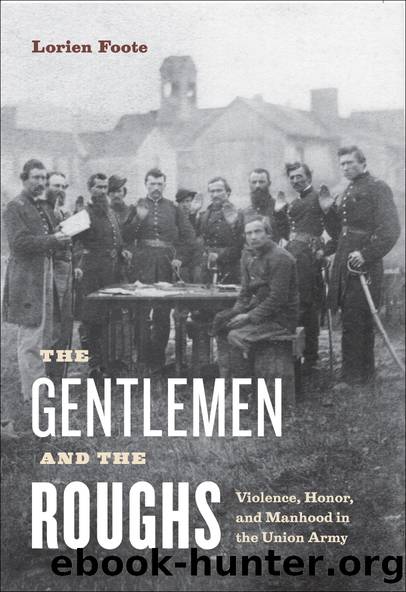The Gentlemen and the Roughs by Lorien Foote

Author:Lorien Foote [Foote, Lorien]
Language: eng
Format: epub
Tags: History, Military, United States, Wars & Conflicts (Other), Civil War Period (1850-1877), Social Science, Men's Studies, Gender Studies
ISBN: 9781479897841
Google: wDEVCgAAQBAJ
Publisher: NYU Press
Published: 2013-06-21T01:43:45+00:00
6 âThe Shoulder-Strap Gentryâ
Officers, Privates, and Equal Manhood
Capt. Daniel Link of the First Maryland Cavalry had posted his guards over a store near a railroad depot in West Virginia in late December 1864. Carloads of Union soldiers, often drunk or rambunctious, passed through the depot on their way to the fighting in Virginia. To maintain order and protect the store, Link gave his guards orders that only three men could enter the store at a time. Later in the day, a train arrived carrying the men of the 36th Ohio, who disembarked and all tried to enter the store. When the guards stopped John Clute and prevented him from joining his friends inside, Clute became verbally abusive. The guards called Captain Link, but when he began issuing orders to Clute, a group of men from the Thirty-sixth who were lounging around the depot arose and began yelling at Link. A witness recalled that they âhollered and wanted to know what shoulder straps were worth. They spoke a great deal of shoulder straps.â One of the men threw a rock at Link and several men began daring Link to come over to them. Clute turned to Link and said, âIf you will lay off your shoulder straps I will give you a damn good whipping.â1
On these details the witnesses at Daniel Linkâs court-martial agreed. What happened next was a subject of dispute. According to the guards, Clute then drew back his fist, but before he could strike the captain, Link whipped out his revolver and shot the insubordinate private. The guards testified that they were in the process of drawing their weapons when Link fired because they believed he was under attack. But the men of the 36th Ohio told another story. They claimed that after Clute challenged Link, the captain drew his revolver and that Clute was turning to run when he was shot.2
The officers presiding over Linkâs court-martial believed the men of the 36th Ohio, found Link guilty of murder, and sentenced him to two years hard labor at the nearest penitentiary. But Link would never serve this sentence. Under army regulations, higher commanders reviewed the results of all courts-martial. Maj. Gen. Winfield Scott Hancock disapproved the sentence and restored Link to command. âThe evidence shows insubordination, insult, contempt, threats of violence and conduct of the most aggravating character by a number of soldiers towards an officer commanding a post and in the rightful discharge of his duties,â the outraged general commented. âThe interests of the service in enforcing good order and military discipline demand that Captain Link should be exonerated.â3
The contempt the men of the 36th Ohio displayed toward âshoulder strapsâ was a pervasive problem in the volunteer Union Army. Within regiments, this contempt was manifested in back talk to officers, a defiant slowness to obey orders, and verbal or physical assertion of equality on the part of enlisted men. Even more damaging to the discipline and the cohesiveness of the army was the tendency of some enlisted men to attack officers who tried to assert authority.
Download
This site does not store any files on its server. We only index and link to content provided by other sites. Please contact the content providers to delete copyright contents if any and email us, we'll remove relevant links or contents immediately.
Cecilia; Or, Memoirs of an Heiress — Volume 1 by Fanny Burney(32538)
Cecilia; Or, Memoirs of an Heiress — Volume 2 by Fanny Burney(31936)
Cecilia; Or, Memoirs of an Heiress — Volume 3 by Fanny Burney(31925)
The Great Music City by Andrea Baker(31912)
We're Going to Need More Wine by Gabrielle Union(19032)
All the Missing Girls by Megan Miranda(15929)
Pimp by Iceberg Slim(14477)
Bombshells: Glamour Girls of a Lifetime by Sullivan Steve(14046)
For the Love of Europe by Rick Steves(13875)
Talking to Strangers by Malcolm Gladwell(13342)
Norse Mythology by Gaiman Neil(13335)
Fifty Shades Freed by E L James(13229)
Mindhunter: Inside the FBI's Elite Serial Crime Unit by John E. Douglas & Mark Olshaker(9313)
Crazy Rich Asians by Kevin Kwan(9272)
The Lost Art of Listening by Michael P. Nichols(7487)
Enlightenment Now: The Case for Reason, Science, Humanism, and Progress by Steven Pinker(7304)
The Four Agreements by Don Miguel Ruiz(6742)
Bad Blood by John Carreyrou(6610)
Weapons of Math Destruction by Cathy O'Neil(6261)
